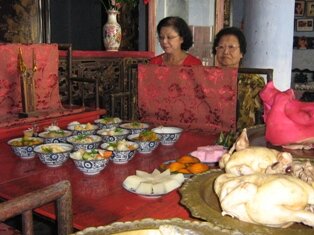Tomb Sweeping Day is a traditional Chinese festival on the 104th day after the winter solstice (or the 15th day from the Spring Equinox), usually occurring around April 5 of the Gregorian calendar . Astronomically it is also a solar term . The Qingming festival falls on the first day of the fifth solar term, named Qingming. Its name denotes a time for people to go outside and enjoy the greenery of springtime (踏青 Tàqīng, "treading on the greenery") and tend to the graves of departed ones.
The Grave Sweeping Festival is an opportunity for celebrants to remember and honour their ancestors at grave sites.
Young and old pray before the ancestors, sweep the tombs and offer food, tea, wine, chopsticks, joss paper accessories, and/or libations to the ancestors. The rites have a long tradition in Asia, especially among farmers. Some people carry willow branches with them on Qingming, or put willow branches on their gates and/or front doors. They believe that willow branches help ward off the evil spirit that wanders on Qingming.
On Qingming people go on family outings, start the spring plowing, sing, dance. Qingming is also the time when young couples start courting. Another popular thing to do is to fly kites in the shapes of animals or characters from Chinese opera. Another common practice is to carry flowers instead of burning paper, incense or firecrackers.
My gigirls and me?? We will just stay home, sort out books and clean the house... :))


















0 comments:
Catat Ulasan